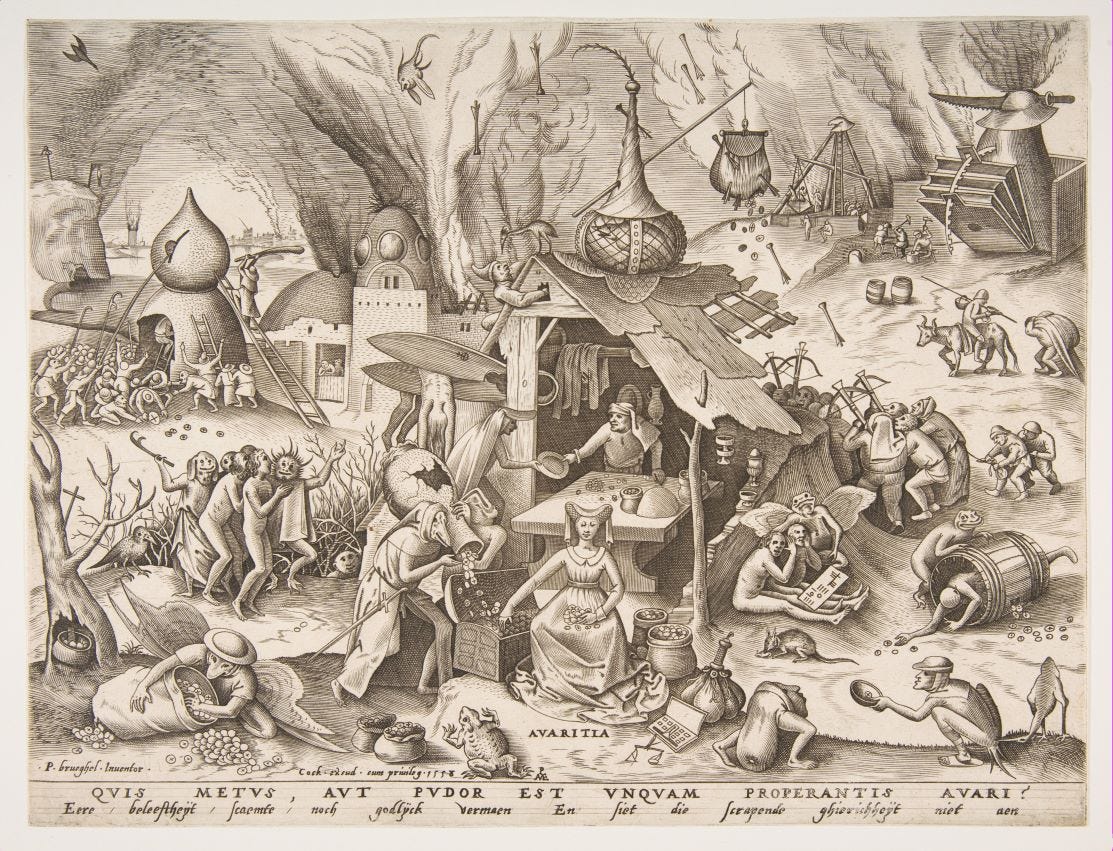In which we look at the antithesis of DOGE (plus some other vocabulary words): the real Federal Mediation and Conciliation Service, the fictional Circumlocution Office, and what is the point of cutting all these rinky-dink agencies?

Episode Links
CONTINUING THE REDUCTION OF THE FEDERAL BUREAUCRACY
By the authority vested in me as President by the Constitution and the laws of the United States of America, it is hereby ordered:
Section 1. Purpose. This order continues the reduction in the elements of the Federal bureaucracy that the President has determined are unnecessary.
Sec. 2. Reducing the Scope of the Federal Bureaucracy.
(a) Except as provided in subsection (b) of this section, the non-statutory components and functions of the following governmental entities shall be eliminated to the maximum extent consistent with applicable law, and such entities shall reduce the performance of their statutory functions and associated personnel to the minimum presence and function required by law:
(i) the Federal Mediation and Conciliation Service;
(ii) the United States Agency for Global Media;
(iii) the Woodrow Wilson International Center for Scholars in the Smithsonian Institution;
(iv) the Institute of Museum and Library Services;
(v) the United States Interagency Council on Homelessness;
(vi) the Community Development Financial Institutions Fund; and
(vii) the Minority Business Development Agency.
(b) Within 7 days of the date of this order, the head of each governmental entity listed in subsection (a) of this section shall submit a report to the Director of the Office of Management and Budget confirming full compliance with this order and explaining which components or functions of the governmental entity, if any, are statutorily required and to what extent.
(c) In reviewing budget requests submitted by the governmental entities listed in subsection (a) of this section, the Director of the Office of Management and Budget or the head of any executive department or agency charged with reviewing grant requests by such entities shall, to the extent consistent with applicable law and except insofar as necessary to effectuate an expected termination, reject funding requests for such governmental entities to the extent they are inconsistent with this order.
Daily Wire on FMCS
https://x.com/lukerosiak/status/1902412374318923833
19 March 2025, Daily Wire: Inside The Now-Shuttered Federal Agency Where Employees Lived ‘Like Reigning Kings’
One of the seven small federal agencies that President Donald Trump ordered downsized or eliminated on Friday was rife with corruption, with its employees hiring friends and relatives, commissioning paintings of themselves, and using government credit cards to indulge in constant luxuries.
The Federal Mediation and Conciliation Service (FMCS) occupied a nine-story office tower on D.C.’s K Street for only 60 employees, many of whom actually worked from home, prior to the pandemic. Its managers had luxury suites with full bathrooms; one manager would often be “in the shower” when she was needed, while another used her bathroom as a cigarette lounge. FMCS recorded its director as being on a years-long business trip to D.C. so he could have all of his meals and living expenses covered by taxpayers, simply for showing up to the office.
FMCS is a 230-employee agency that exists to serve as a voluntary mediator between unions and businesses. As an “independent agency,” its director nominally reports to the president, but the agency is so small that in effect, there is no oversight at all — and it showed, becoming a real-life caricature of all the excesses that the Department of Government Efficiency has alleged take place in government.
….
FMCS seemed, quite clearly, to exist for the benefit of those on its payroll, and not much else. One employee told me: “Let me give you the honest truth: A lot of FMCS employees don’t do a hell of a lot, including myself. Personally, the reason that I’ve stayed is that I just don’t feel like working that hard, plus the location on K Street is great, plus we all have these oversized offices with windows, plus management doesn’t seem to care if we stay out at lunch a long time. Can you blame me?”
“Recreation and reception fund.”
Top FMCS official George Cohen used a “recreation and reception fund” to order champagne and $200 coasters for his office, and to purchase artwork painted by his wife. The tiny agency commissioned paintings of its top employees — as one employee told me, “like they were reigning kings or something…I’ve never seen anything like it before.” It spent $2,402 retouching the portrait of someone who briefly held the top job in an acting capacity.
….
When Charles Burton retired from FMCS, he incorporated an LLC to which another FMCS employee paid $85,000 using his purchase card, listing it as a “Call Center Service,” even though the company had neither a website nor a working phone.
When an accountant, Carol Booth, blew the whistle on financial abuses to the General Services Administration, which manages purchase cards and contracting, Cohen forced her to send an email (which he wrote under her name) rescinding her statement.
Like something out of “The Office,” the employees spent an inordinate amount of time and money congratulating one another for being employed there and engaging in “work” that really amounted to pampering themselves.
….
What surprised me most about my FMCS investigation was what happened afterward: nothing. An inspector general made a referral to the FBI, but there were no prosecutions. Instead, President Barack Obama nominated a chief subject of the investigation to the top job.
A decade later, Trump has done what even the agency’s own employees said should happen: shut it down.
Circumlocution Office
Little Dorrit, Project Gutenberg
There’s a good miniseries from 2008: IMDB Listing
It stars Clare Foy and Matthew McFayden. Andy Serkis is the villain.
The miniseries is available on Prime: Little Dorrit - alas, I don’t think the Circumlocution Office comes up in this adaptation.
That’s the benefit of reading the book.
CHAPTER 10. Containing the whole Science of Government
The Circumlocution Office was (as everybody knows without being told) the most important Department under Government. No public business of any kind could possibly be done at any time without the acquiescence of the Circumlocution Office. Its finger was in the largest public pie, and in the smallest public tart. It was equally impossible to do the plainest right and to undo the plainest wrong without the express authority of the Circumlocution Office. If another Gunpowder Plot had been discovered half an hour before the lighting of the match, nobody would have been justified in saving the parliament until there had been half a score of boards, half a bushel of minutes, several sacks of official memoranda, and a family-vault full of ungrammatical correspondence, on the part of the Circumlocution Office.
This glorious establishment had been early in the field, when the one sublime principle involving the difficult art of governing a country, was first distinctly revealed to statesmen. It had been foremost to study that bright revelation and to carry its shining influence through the whole of the official proceedings. Whatever was required to be done, the Circumlocution Office was beforehand with all the public departments in the art of perceiving—HOW NOT TO DO IT.
Through this delicate perception, through the tact with which it invariably seized it, and through the genius with which it always acted on it, the Circumlocution Office had risen to overtop all the public departments; and the public condition had risen to be—what it was.
It is true that How not to do it was the great study and object of all public departments and professional politicians all round the Circumlocution Office. It is true that every new premier and every new government, coming in because they had upheld a certain thing as necessary to be done, were no sooner come in than they applied their utmost faculties to discovering How not to do it. It is true that from the moment when a general election was over, every returned man who had been raving on hustings because it hadn’t been done, and who had been asking the friends of the honourable gentleman in the opposite interest on pain of impeachment to tell him why it hadn’t been done, and who had been asserting that it must be done, and who had been pledging himself that it should be done, began to devise, How it was not to be done. It is true that the debates of both Houses of Parliament the whole session through, uniformly tended to the protracted deliberation, How not to do it. It is true that the royal speech at the opening of such session virtually said, My lords and gentlemen, you have a considerable stroke of work to do, and you will please to retire to your respective chambers, and discuss, How not to do it. It is true that the royal speech, at the close of such session, virtually said, My lords and gentlemen, you have through several laborious months been considering with great loyalty and patriotism, How not to do it, and you have found out; and with the blessing of Providence upon the harvest (natural, not political), I now dismiss you. All this is true, but the Circumlocution Office went beyond it.
Because the Circumlocution Office went on mechanically, every day, keeping this wonderful, all-sufficient wheel of statesmanship, How not to do it, in motion. Because the Circumlocution Office was down upon any ill-advised public servant who was going to do it, or who appeared to be by any surprising accident in remote danger of doing it, with a minute, and a memorandum, and a letter of instructions that extinguished him. It was this spirit of national efficiency in the Circumlocution Office that had gradually led to its having something to do with everything. Mechanicians, natural philosophers, soldiers, sailors, petitioners, memorialists, people with grievances, people who wanted to prevent grievances, people who wanted to redress grievances, jobbing people, jobbed people, people who couldn’t get rewarded for merit, and people who couldn’t get punished for demerit, were all indiscriminately tucked up under the foolscap paper of the Circumlocution Office.
Numbers of people were lost in the Circumlocution Office. Unfortunates with wrongs, or with projects for the general welfare (and they had better have had wrongs at first, than have taken that bitter English recipe for certainly getting them), who in slow lapse of time and agony had passed safely through other public departments; who, according to rule, had been bullied in this, over-reached by that, and evaded by the other; got referred at last to the Circumlocution Office, and never reappeared in the light of day. Boards sat upon them, secretaries minuted upon them, commissioners gabbled about them, clerks registered, entered, checked, and ticked them off, and they melted away. In short, all the business of the country went through the Circumlocution Office, except the business that never came out of it; and its name was Legion.
Sometimes, angry spirits attacked the Circumlocution Office. Sometimes, parliamentary questions were asked about it, and even parliamentary motions made or threatened about it by demagogues so low and ignorant as to hold that the real recipe of government was, How to do it. Then would the noble lord, or right honourable gentleman, in whose department it was to defend the Circumlocution Office, put an orange in his pocket, and make a regular field-day of the occasion. Then would he come down to that house with a slap upon the table, and meet the honourable gentleman foot to foot. Then would he be there to tell that honourable gentleman that the Circumlocution Office not only was blameless in this matter, but was commendable in this matter, was extollable to the skies in this matter. Then would he be there to tell that honourable gentleman that, although the Circumlocution Office was invariably right and wholly right, it never was so right as in this matter. Then would he be there to tell that honourable gentleman that it would have been more to his honour, more to his credit, more to his good taste, more to his good sense, more to half the dictionary of commonplaces, if he had left the Circumlocution Office alone, and never approached this matter. Then would he keep one eye upon a coach or crammer from the Circumlocution Office sitting below the bar, and smash the honourable gentleman with the Circumlocution Office account of this matter. And although one of two things always happened; namely, either that the Circumlocution Office had nothing to say and said it, or that it had something to say of which the noble lord, or right honourable gentleman, blundered one half and forgot the other; the Circumlocution Office was always voted immaculate by an accommodating majority.
[chapter passes]
‘Mr Clennam?’ said Mr Barnacle. ‘Be seated.’
Mr Clennam became seated.
‘You have called on me, I believe,’ said Mr Barnacle, ‘at the Circumlocution—’ giving it the air of a word of about five-and-twenty syllables—‘Office.’
‘I have taken that liberty.’
Mr Barnacle solemnly bent his head as who should say, ‘I do not deny that it is a liberty; proceed to take another liberty, and let me know your business.’
‘Allow me to observe that I have been for some years in China, am quite a stranger at home, and have no personal motive or interest in the inquiry I am about to make.’
Mr Barnacle tapped his fingers on the table, and, as if he were now sitting for his portrait to a new and strange artist, appeared to say to his visitor, ‘If you will be good enough to take me with my present lofty expression, I shall feel obliged.’
‘I have found a debtor in the Marshalsea Prison of the name of Dorrit, who has been there many years. I wish to investigate his confused affairs so far as to ascertain whether it may not be possible, after this lapse of time, to ameliorate his unhappy condition. The name of Mr Tite Barnacle has been mentioned to me as representing some highly influential interest among his creditors. Am I correctly informed?’
It being one of the principles of the Circumlocution Office never, on any account whatever, to give a straightforward answer, Mr Barnacle said, ‘Possibly.’
‘On behalf of the Crown, may I ask, or as private individual?’
‘The Circumlocution Department, sir,’ Mr Barnacle replied, ‘may have possibly recommended—possibly—I cannot say—that some public claim against the insolvent estate of a firm or copartnership to which this person may have belonged, should be enforced. The question may have been, in the course of official business, referred to the Circumlocution Department for its consideration. The Department may have either originated, or confirmed, a Minute making that recommendation.’
‘I assume this to be the case, then.’
‘The Circumlocution Department,’ said Mr Barnacle, ‘is not responsible for any gentleman’s assumptions.’
‘May I inquire how I can obtain official information as to the real state of the case?’
‘It is competent,’ said Mr Barnacle, ‘to any member of the—Public,’ mentioning that obscure body with reluctance, as his natural enemy, ‘to memorialise the Circumlocution Department. Such formalities as are required to be observed in so doing, may be known on application to the proper branch of that Department.’
‘Which is the proper branch?’
‘I must refer you,’ returned Mr Barnacle, ringing the bell, ‘to the Department itself for a formal answer to that inquiry.’
‘Excuse my mentioning—’
‘The Department is accessible to the—Public,’ Mr Barnacle was always checked a little by that word of impertinent signification, ‘if the—Public approaches it according to the official forms; if the—Public does not approach it according to the official forms, the—Public has itself to blame.’
Mr Barnacle made him a severe bow, as a wounded man of family, a wounded man of place, and a wounded man of a gentlemanly residence, all rolled into one; and he made Mr Barnacle a bow, and was shut out into Mews Street by the flabby footman.
‘I want to know—’
‘Look here. Upon my soul you mustn’t come into the place saying you want to know, you know,’ remonstrated Barnacle junior, turning about and putting up the eye-glass.
‘I want to know,’ said Arthur Clennam, who had made up his mind to persistence in one short form of words, ‘the precise nature of the claim of the Crown against a prisoner for debt, named Dorrit.’
‘I say. Look here. You really are going it at a great pace, you know. Egad, you haven’t got an appointment,’ said Barnacle junior, as if the thing were growing serious.
‘I want to know,’ said Arthur, and repeated his case.
Barnacle junior stared at him until his eye-glass fell out, and then put it in again and stared at him until it fell out again. ‘You have no right to come this sort of move,’ he then observed with the greatest weakness. ‘Look here. What do you mean? You told me you didn’t know whether it was public business or not.’
‘I have now ascertained that it is public business,’ returned the suitor, ‘and I want to know’—and again repeated his monotonous inquiry.
Its effect upon young Barnacle was to make him repeat in a defenceless way, ‘Look here! Upon my SOUL you mustn’t come into the place saying you want to know, you know!’ The effect of that upon Arthur Clennam was to make him repeat his inquiry in exactly the same words and tone as before. The effect of that upon young Barnacle was to make him a wonderful spectacle of failure and helplessness.
Office Space
Quotes:
Peter Gibbons: The thing is, Bob, it's not that I'm lazy, it's that I just don't care.
Bob Porter: Don't... don't care?
Peter Gibbons: It's a problem of motivation, all right? Now if I work my ass off and Initech ships a few extra units, I don't see another dime, so where's the motivation? And here's something else, Bob: I have eight different bosses right now.
Bob Slydell: I beg your pardon?
Peter Gibbons: Eight bosses.
Bob Slydell: Eight?
Peter Gibbons: Eight, Bob. So that means that when I make a mistake, I have eight different people coming by to tell me about it. That's my only real motivation is not to be hassled, that and the fear of losing my job. But you know, Bob, that will only make someone work just hard enough not to get fired.
Bill Lumbergh: Hello Peter, what's happening? Ummm, I'm gonna need you to go ahead come in tomorrow. So if you could be here around 9 that would be great, mmmk... oh oh! and I almost forgot ahh, I'm also gonna need you to go ahead and come in on Sunday too, kay. We ahh lost some people this week and ah, we sorta need to play catch up.
Dom Portwood: Hi, Peter. What's happening? We need to talk about your TPS reports.
Peter Gibbons: Yeah. The coversheet. I know, I know. Uh, Bill talked to me about it.
Dom Portwood: Yeah. Did you get that memo?
Peter Gibbons: Yeah. I got the memo. And I understand the policy. And the problem is just that I forgot the one time. And I've already taken care of it so it's not even really a problem anymore.
Dom Portwood: Ah! Yeah. It's just we're putting new coversheets on all the TPS reports before they go out now. So if you could go ahead and try to remember to do that from now on, that'd be great. All right!














Share this post